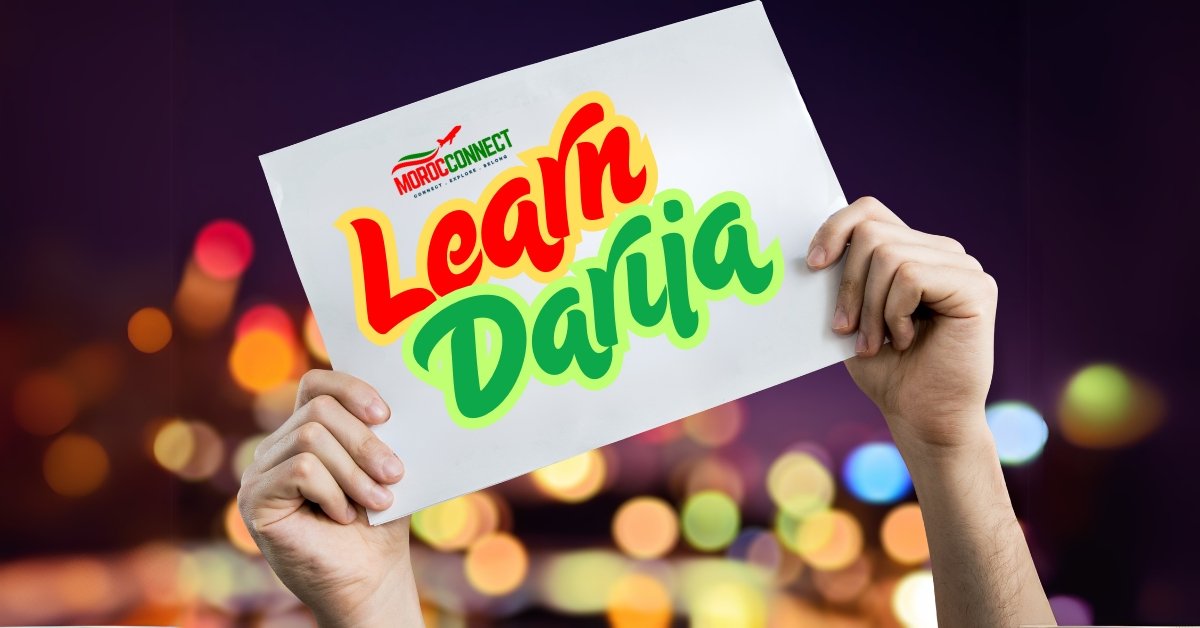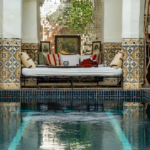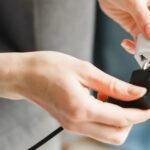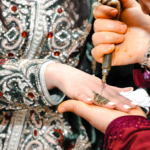Start Learning Moroccan Arabic (Darija) Now!
Thinking about exploring the vibrant streets of Marrakech, the ancient medinas of Fes, or connecting with Moroccan culture on a deeper level? The best way to enrich your experience is by speaking the local language! Moroccan Arabic, or Darija, is the dynamic dialect used by over 30 million people daily. Forget waiting – you can start learning Darija now and immediately begin connecting with locals.
Unlike Modern Standard Arabic, Darija is the practical language of everyday interactions. It’s a fascinating blend of Arabic, French, Spanish, and Amazigh influences, making it unique and incredibly useful right away.
This guide is designed as Your Quick Guide to Essential Phrases. We’ve cut through the complexity to bring you the most important Darija phrases you need to know, alongside easy pronunciation tips and key cultural insights. Get ready to speak confidently and enhance your Moroccan journey today!
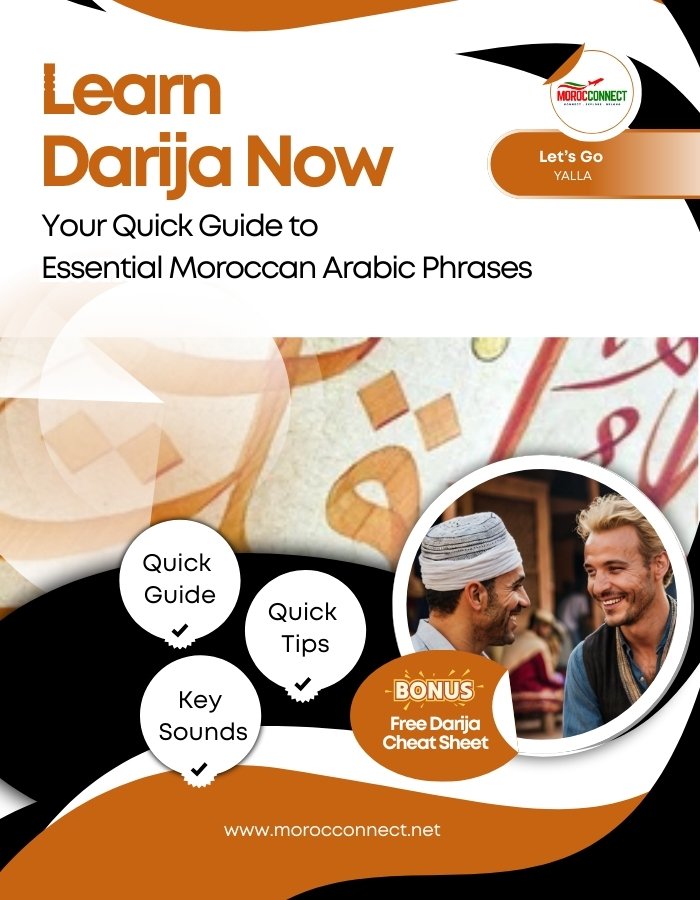
Why Focus on Essential Darija Phrases?
While becoming fluent takes time, mastering essential phrases provides immediate benefits. Darija is Morocco’s living language, used everywhere from bustling markets to quiet homes. Focusing on key phrases allows you to:
- Navigate with Ease: Ask for directions, understand prices, and get around more confidently.
- Connect with Locals: Simple greetings and polite expressions open doors to warmer interactions.
- Enhance Your Experiences: Enjoy shopping, dining, and cultural activities more fully.
- Show Respect: Making an effort to speak Darija is deeply appreciated by Moroccans.
Darija’s unique characteristics, like its mix of influences, simplified grammar compared to Classical Arabic, and specific phonetic sounds, make these essential phrases practical and widely understood across Morocco.
What Makes Moroccan Arabic Unique?
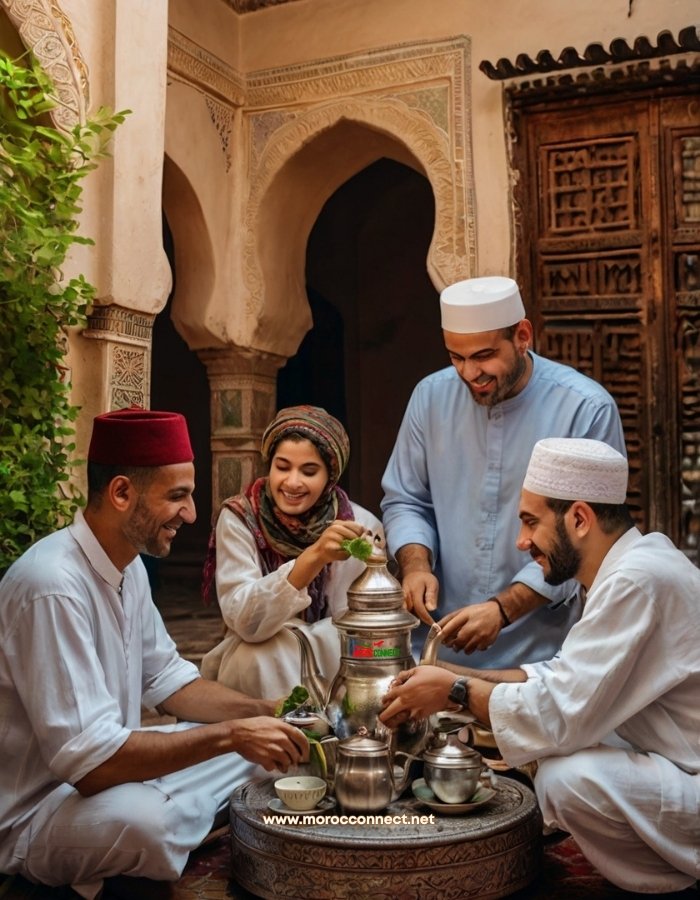
Darija isn’t just a simplified version of MSA; it’s a dynamic dialect with its own rhythm and rules. It serves as Morocco’s lingua franca. Key features that set it apart include:
- A Rich Tapestry of Influences: Darija has generously borrowed from languages it has come into contact with throughout history. Borrows practical words from:
- French: (e.g., “tomobile” from French “automobile” for car, “salon” from French “salon” for living room, “balisa” from French “valise” for suitcase)
- Spanish: (e.g., “kuzina” from Spanish “cocina” for kitchen, “simana” from Spanish “semana” for week, “blasa” from Spanish “plaza” for place)
- Berber: (e.g., “tamara” from Amazigh for hardship/effort, “walou” from Amazigh for nothing) This mix makes Darija unique and perfectly adapted for daily life in Morocco.
- Simplified Grammatical Structures: Compared to the complex grammatical rules and verb conjugations of Classical or Modern Standard Arabic, Darija generally features a more simplified grammar, especially in its verbal system. This can make it feel more approachable for beginners.
- Phonetic Flexibility and Distinct Sounds: While based on Arabic script, Darija pronunciation has its own characteristics. Some sounds common in MSA are less prominent or absent, while certain letters have distinct pronunciations. The use of numbers like ‘7’, ‘3’, and ‘9’ in written transcription helps represent sounds that don’t have direct equivalents in the Latin alphabet.
Your Quick Guide to Essential Moroccan Arabic Phrases
Mastering these phrases from the start will allow you to communicate in common situations right away:
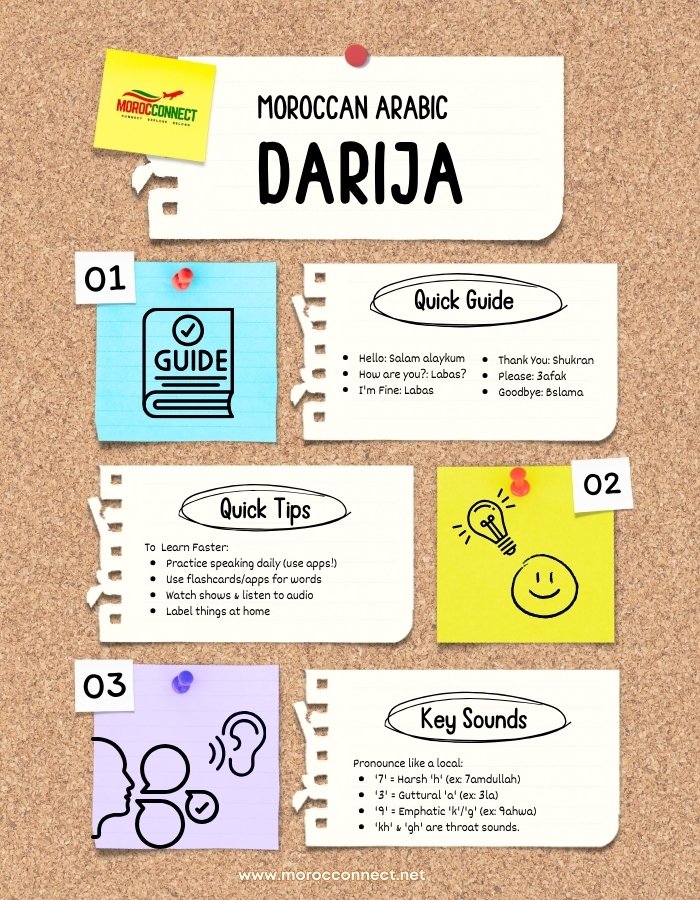
1. Greetings and Polite Essentials
Beyond the initial “Salam alaykum,” these phrases are key to showing respect and building rapport:
- Hello: السلام عليكم (Assalamu alaykum) – The most common and respectful greeting.
- Response to Hello: وعليكم السلام (Wa alaykumu salam)
- Hi (more casual): سلام (Salam)
- How are you?: لاباس؟ (Labas?) – Very common and versatile.
- Are you fine?: لاباس عليك؟ (Labas 3lik?)
- I’m fine: لاباس (Labas) or أنا بخير (Ana bkhir)
- I’m fine, thank Allah: لاباس الحمد لله (Labas, Hamdullah) – A very common and culturally significant response.
- Goodbye: بالسلامة (Bslama)
- See you later: نشوفك من بعد (Nshufk mn b3d)
- Please: عفاك (3afak) – Used when asking for something.
- Thank you: شكراً (Shukran)
- Thank you very much: شكراً بزاف (Shukran bzzaf)
- You’re welcome: لا شكر على واجب (La shukra al wajeb) or على الراس والعين (3la rras w l3ayn) – Literally “on my head and my eye,” a very polite response.
- Excuse me / Sorry: سمح لي (Sme7 li) (to a male), سمحي لي (Sm7i li) (to a female)
- No problem: ماشي مشكل (Mashi mushkil)
2. Introductions
Getting to know people is a key part of the Moroccan experience:
- What is your name?: شنو سميتك؟ (Shnu smaytek?)
- My name is…: سميتي… (Smiti…)
- Where are you from?: منين نتا؟ (Mnien nta?) (to a male), منين نتي؟ (Mnien nti?) (to a female)
- I am from…: أنا من… (Ana mn…)
- Nice to meet you: متشرفين (Mtshrfin)
3. Dining & Shopping
Essential phrases for enjoying Moroccan cuisine and navigating the souks:
- How much is this?: شحال هادا؟ (Sh7al hada?) or بشحال هادي؟ (Bsh7al hadi?)
- How much is it?: بشحال؟ (Bsh7al?)
- This is expensive: غالي بزاف (Ghaali bzzaf) (masculine), غالية بزاف (Ghalya bzzaf) (feminine)
- Can you lower the price?: ممكن تنقص ليا الثمن؟ (Mumkin tn9ess liya taman?)
- I want…: بغيت… (Bghit…)
- I don’t want…: ما بغيتش… (Ma bghitsh…)
- Delicious: بنين (Bnin) (masculine), بنينة (Bnina) (feminine)
- I’m hungry: فيا الجوع (Fiya jou3)
- I’m thirsty: فيا العطش (Fiya la3tach)
- Water: الما (Al ma)
- Bread: خبز (Khobz)
- Coffee: قهوة (9ahwa)
- Tea (Mint Tea): أتاي (Atay) – Often pronounced “atay nna3na3” for mint tea.
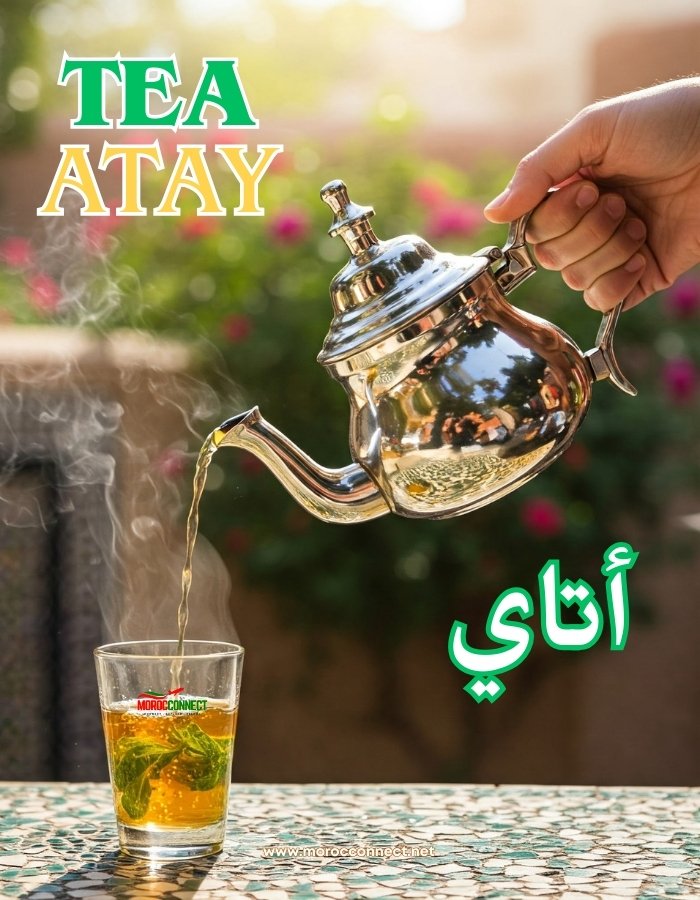
4. Directions
Finding your way around:
- Where is…?: فين…؟ (Fin…?)
- Left: ليسر (Lissar)
- Right: ليمن (Limen)
- Straight ahead: نيشان (Nishan)
- Here: هنا (Hna)
- There: تما (Tamma)
5. Numbers
Basic numbers are very useful, especially for shopping:
- One: واحد (Wa7ed)
- Two: جوج (Juj)
- Three: ثلاثة (Tlata)
- Four: أربعة (Arba3a)
- Five: خمسة (Khemsa)
- Six: ستة (Setta)
- Seven: سبعة (Sab3a)
- Eight: ثمانية (Tmenya)
- Nine: تسعود (Ts3ud)
- Ten: عشرة (3shra)
6. Emergency Phrases
Important phrases for when you need help:
- Help!: عاوني! (Aawni!)
- I need a doctor: خصني طبيب (Khasni tbib)
- Call the police: عيط للبوليس (3ayyet li l-bulis)
- I am lost: تلف ليا الطريق (Tlef liya t-tariq)
(Pro Tip: Integrating interjections like “wakha” [OK], “zeed” [more], “safi” [enough/finished/okay], “yalla” [let’s go/come on] will make you sound much more natural!)
Quick Reference Table: Essential Darija Phrases & Words
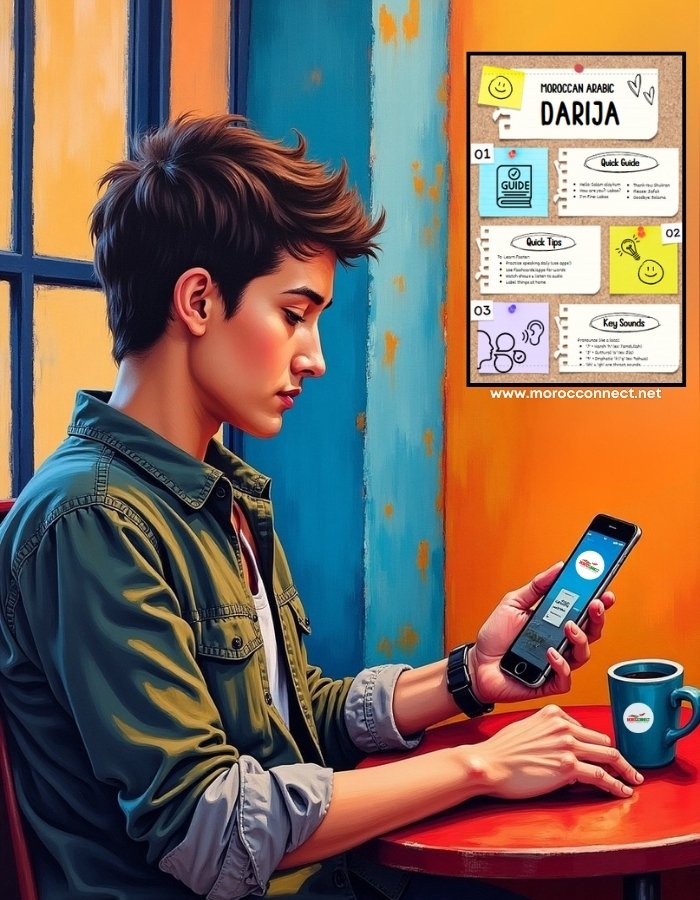
Here’s a summary of the key phrases and words to get you started in Moroccan Arabic right away:
| English | Darija (Transcription) | Darija (Arabic Script) | Category |
|---|---|---|---|
| Hello | Salam alaykum | السلام عليكم | Greetings & Polite Essentials |
| Response to Hello | Wa alaykum salam | وعليكم السلام | Greetings & Polite Essentials |
| How are you? | Labas? | لاباس؟ | Greetings & Polite Essentials |
| I’m fine | Labas / Ana bkhir | لاباس / أنا بخير | Greetings & Polite Essentials |
| Thank you | Shukran | شكراً | Greetings & Polite Essentials |
| Please | 3afak | عفاك | Greetings & Polite Essentials |
| Goodbye | Bslama | بالسلامة | Greetings & Polite Essentials |
| Excuse me / Sorry (m) | Sme7 li | سمح لي | Greetings & Polite Essentials |
| Excuse me / Sorry (f) | Sm7i li | سمحي لي | Greetings & Polite Essentials |
| No problem | Mashi mushkil | ماشي مشكل | Greetings & Polite Essentials |
| What is your name? | Shnu smaytek? | شنو سميتك؟ | Introductions |
| My name is… | Smiti… | سميتي… | Introductions |
| Where are you from? (m) | Mnien nta? | منين نتا؟ | Introductions |
| Where are you from? (f) | Mnien nti? | منين نتي؟ | Introductions |
| I am from… | Ana mn… | أنا من… | Introductions |
| Nice to meet you | Mtshrfin | متشرفين | Introductions |
| How much is this? | Sh7al hada? | شحال هادا؟ | Dining & Shopping |
| This is expensive | Ghaali bzzaf (m) | غالي بزاف | Dining & Shopping |
| Delicious | Bnin (m) | بنين | Dining & Shopping |
| I want… | Bghit… | بغيت… | Dining & Shopping |
| I don’t want… | Ma bghitsh… | ما بغيتش… | Dining & Shopping |
| Water | Al ma | الما | Dining & Shopping |
| Bread | Khobz | خبز | Dining & Shopping |
| Coffee | 9ahwa | قهوة | Dining & Shopping |
| Tea | Atay | أتاي | Dining & Shopping |
| Where is…? | Fin…? | فين…؟ | Directions |
| Left | Lissar | ليسر | Directions |
| Right | Limen | ليمن | Directions |
| Straight ahead | Nishan | نيشان | Directions |
| Here | Hna | هنا | Directions |
| There | Tamma | تما | Directions |
| One | Wa7ed | واحد | Numbers |
| Two | Juj | جوج | Numbers |
| Three | Tlata | ثلاثة | Numbers |
| Four | Arba3a | أربعة | Numbers |
| Five | Khemsa | خمسة | Numbers |
| Six | Setta | ستة | Numbers |
| Seven | Sab3a | سبعة | Numbers |
| Eight | Tmenya | ثمانية | Numbers |
| Nine | Ts3ud | تسعود | Numbers |
| Ten | 3shra | عشرة | Numbers |
| Help! | Aawni | عاوني | Emergency Phrases |
| I need a doctor | Khasni tbib | خصني طبيب | Emergency Phrases |
| Call the police | 3ayyet lil bulis | عيط للبوليس | Emergency Phrases |
| I am lost | Tlef liya t-tariq | تلف ليا الطريق | Emergency Phrases |
Darija Pronunciation Guide: Get It Right Quickly
Getting the sounds right is key to being understood. Focus on these unique Darija sounds:
- “7”: Represents a strong, breathy ‘h’ sound produced from the back of the throat (similar to the ‘ch’ in the Scottish “loch”). e.g., 7amdullah (thank Allah).
- “3”: Represents the Arabic letter ‘ayn’, a guttural sound produced by constricting the throat. It’s often described as a voiced pharyngeal fricative and doesn’t have a direct English equivalent. e.g., 3la (on), shukran lak (thank you – the ‘a’ sound).
- “9”: Represents the Arabic letter ‘qaf’, an emphatic ‘k’ sound pronounced further back in the throat, sometimes sounding closer to a hard ‘g’. e.g., 9ahwa (coffee), kteb (book).
- “kh”: Similar to the ‘ch’ in the German word “nacht” or the Scottish “loch”. e.g., khobz (bread).
- “gh”: A voiced version of “kh”, similar to the French ‘r’ sound. e.g., Maghrib (Morocco).
Practice these specific sounds, and you’ll be speaking Darija more authentically in no time!
5 Quick Tips to Learn Essential Darija Faster
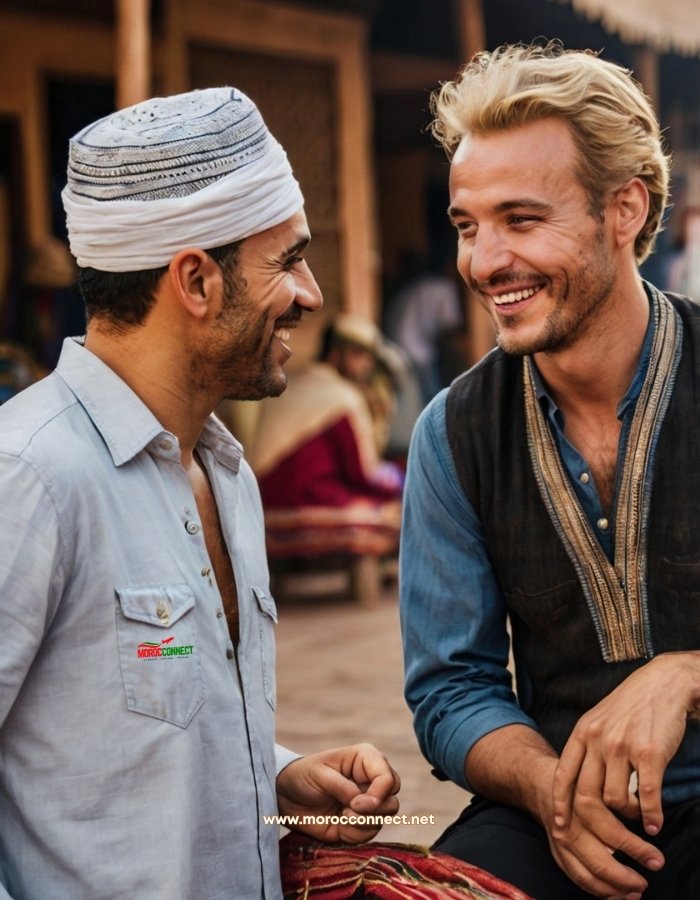
Accelerate your learning with these practical tips:
- Watch Moroccan Shows & Movies: Platforms like YouTube have a wealth of Moroccan content. Look for popular series like “Dar L’ftor” or “Lalla Fatima” with subtitles if possible. This helps with listening comprehension and colloquialisms.
- Practice with Native Speakers: Language exchange apps such as Tandem or HelloTalk connect you with Moroccans eager to practice their English in exchange for helping you with Darija. In-person meetups if you’re in Morocco are even better!
- Utilize Flashcards and Language Apps: Apps like Anki or Quizlet are excellent for memorizing vocabulary. Look for apps specifically designed for Moroccan Arabic, as general Arabic apps focus on MSA.
- Listen to Darija Podcasts and Audio Lessons: Explore online resources that provide lessons in spoken Darija. This is a great way to improve your listening and pick up natural conversation patterns.
- Label Your Environment: Write the Darija words for everyday objects on sticky notes and place them around your home (e.g., “bab” for door, “serir” for bed).
Cultural Nuances for Using Your Phrases
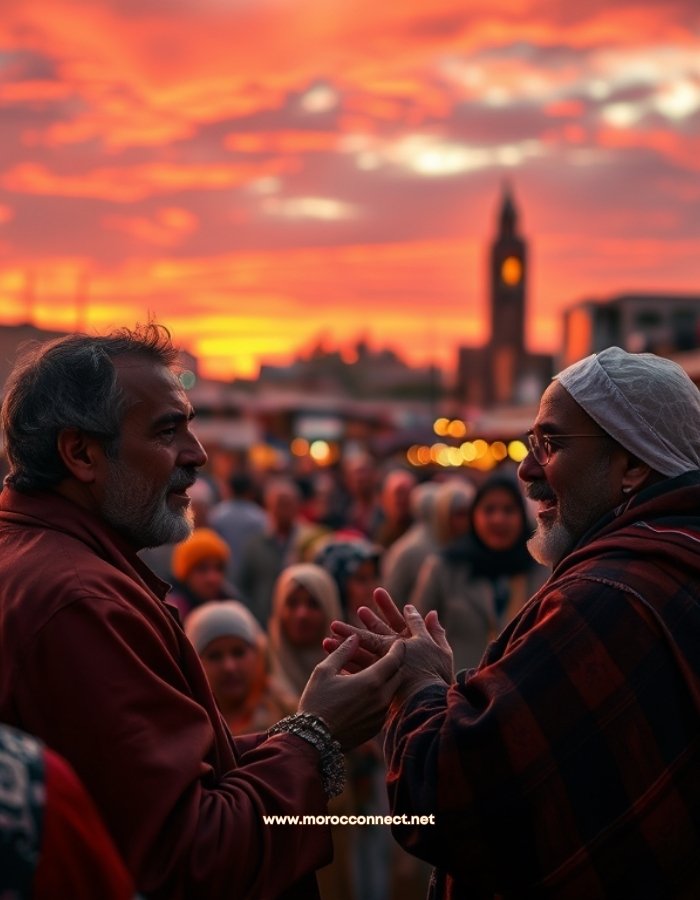
Using your essential phrases within the right cultural context is key to positive interactions:
- Greetings are Extended: Moroccans often engage in longer greetings than in many Western cultures, asking about health, family, and well-being. Don’t rush this process; it’s an important part of building connection.
- Indirectness is Common: Direct “no” answers or blunt statements are often avoided to maintain harmony and prevent potential offense. Phrases like “Insha’Allah” (Allah willing) can sometimes imply a polite refusal or uncertainty rather than a firm commitment. Learning to read between the lines is a valuable skill.
- Building Rapport is Key: Especially in business or more formal interactions, Moroccans value getting to know you and building a relationship before getting straight to the point. Be prepared for initial small talk and personal questions.
- Hospitality is Paramount: Accepting offers of mint tea or food is a sign of respect and appreciation for Moroccan generosity. Even if you’re not thirsty or hungry, accepting a small amount is a good gesture.
- Non-Verbal Communication: Pay attention to body language and facial expressions. A nod often means yes, while a shake of the head can mean no or “I’m not sure.” Hand gestures are also commonly used.
FAQs About Learning Moroccan Arabic Quickly
Here are some common questions about learning Darija now:
Q: Is Darija completely different from Standard Arabic? A: Yes and no. They share a common root, so there’s some shared vocabulary, but the grammar, pronunciation, and the inclusion of loanwords make Darija distinct and generally not mutually intelligible with MSA for beginners. Learning MSA won’t automatically allow you to understand or speak Darija fluently.
Q: How quickly can I learn basic Darija using this guide? A: By focusing on these essential phrases and practicing daily, you can start using basic Darija in everyday situations within just a few days! Consistent practice will build your confidence rapidly.
Q: Can I use Darija outside Morocco? A: Darija is most widely understood in Algeria and Tunisia due to geographical proximity and historical ties, although their dialects (Algerian and Tunisian Arabic) have their own variations. It is less understood in further Arab countries.
Q: Do I need to learn the Arabic alphabet to speak Darija quickly? A: For speaking essential phrases quickly, no. You can use phonetic transcriptions. However, learning the alphabet later will greatly help your pronunciation and ability to learn more vocabulary.
Q: Is it hard to learn these essential Darija phrases? A: Not at all! By focusing on this curated list, the most common and useful phrases are highlighted, making your initial learning process much easier and more effective.
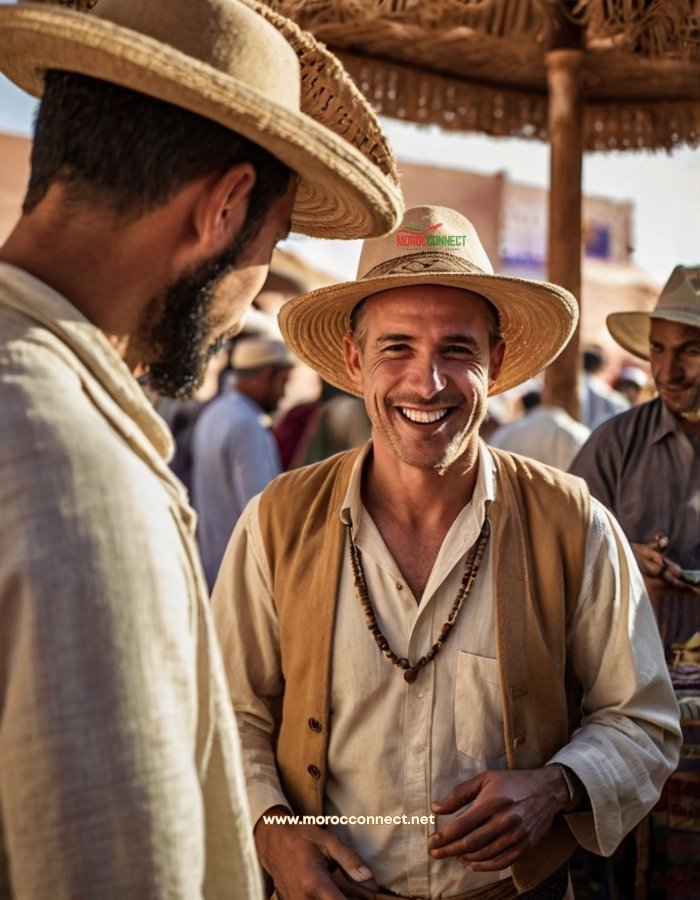
Learn Darija Now and Transform Your Experience!
You don’t need to wait to start connecting with Morocco on a deeper level. Learn Darija now using this quick guide to essential phrases and unlock richer interactions, smoother travels, and unforgettable cultural experiences.
Bookmark this guide, practice these essential phrases, and take the first step today! For even more vocabulary and a handy reference, explore our free Darija cheat sheet.
Learning Darija is a journey, and starting with essential phrases is the perfect way to begin now. Embrace the challenge, speak the language, and immerse yourself in the heart and soul of Morocco.

